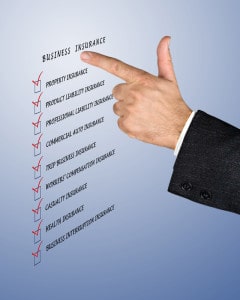Running a business involves a number of risks; you risk your capital, time, and effort on a venture that may or may not pay off. If you are in an industry with a proven demand for your product/service and execute effectively, you will likely turn a profit. However, even after you become successful, your profits are also at risk from a number of potential liabilities.
From the beginning, it is best to set yourself up so that the success you achieve will not be taken from you because of a ‘hole’ in your insurance coverage. Sit down with a Maryland business insurance agent, preferably an independent that represents multiple major carriers, and map out a strategy to ensure that you have the proper coverages, so you can relax and focus on building your business.
Every company is unique and will have its own set of insurance needs. However, there are some common insurance products all businesses should consider. Here are some of the basics to discuss with your agent:
Business Property Insurance: If you own or rent a commercial office, it is a must to have your property and equipment insured against theft, fire, vandalism, and other such events. In many cases, a business cannot function without its equipment in working order. If this is true with your business, you may want to consider going beyond just coverage for replacing the equipment. A rider can often be added to cover business interruption or loss of earnings.
Business Liability Insurance: Liability is another critical coverage for virtually all businesses, even those that are home-based. Liability insurance covers your business for damage done by you, your employees, your products, or services to customer or third party. 
Business Owner’s Policy (BOP): Often, your property, liability, and other necessary coverages can be bundled into a more cost-effective product known as a business owner’s policy. A BOP can be customized to fit the needs of your business so you are only insuring the areas that are applicable to you and not paying more than you should.
Commercial Vehicle Insurance: Many businesses employ vehicles to make occasional deliveries or do other company-related work. Commercial auto insurance protects all company vehicles according to the state requirements and/or the level of coverage you are most comfortable with.
Worker’s Compensation Insurance: If you have any W2 employees, you are required to carry workman’s comp insurance. This provides no-fault coverage to employees who are injured on the job to compensate for lost wages and medical expenses. In exchange for offering worker’s comp, employees forfeit the right to sue the company for anything related to the incident.
About The Author
Todd Balderson has been protecting families and businesses through insurance coverage since 1996. He is the founder of Balderson Insurance Agency and serves clients in Maryland, DC, and Virginia. Todd is known for reminding people about how “insurance is more crucial to building your wealth than investments because without insurance, it’s easy to lose your assets.†Learn more about Todd and the insurance protection he offers at https://www.BaldersonInsurance.com
